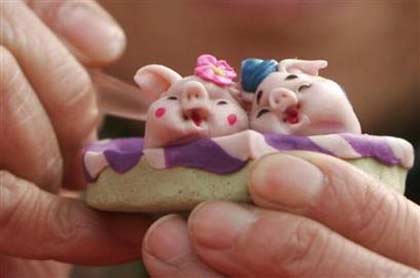Parents pick lucky year for "piglets"
(Agencies)Updated: 2007-02-14 09:24
 A man makes a sculpture of pigs at a temple fair in Shenyang, northeast China's Liaoning province, February 13, 2007. [Reuters]  |
A baby boom is about to hit parts of Asia, as couples try to ensure their
newborns get a happy, wealthy life by starting off in the Year of the Pig.
This Chinese lunar new year, which
starts on February 18, is believed to be an especially auspicious "golden pig
year" which only comes around every 60 years.
South Korea is going a step further, saying it's the best time in 600 years to have a baby due to an anomaly on the Chinese calendar where this pig year -- known as "red," the color of wealth, follows a year with two days to mark the start of spring.
In China baby-related businesses are bracing for an influx of "piglets."
"The Year of the Pig will certainly be busy. There will be a lot of precious pigs born this year, because of the Chinese superstition that pig babies will have an easy life," said Tian Hua, who manages a nanny sourcing firm in Shanghai.
Tian's firm specializes in caring for mothers and infants during the first month after birth, when Chinese tradition holds that a woman should rest and eat special foods.
Her 200 nannies are booked through July, and the company has raised prices by up to 45 percent, she said. Hospitals in the Chinese mainland and Hong Kong are also heavily booked.
In South Korea, which has one of the world's lowest birth rates, the Year of the Pig could herald the bundles of joy that years of government incentives have failed to create.
South Korea has seen a recent rush of expectant mothers at maternity clinics, keen to have their babies after February 18.
Fortune teller Kang Pan-seok, however, says 2007 is not the super lucky event it's been hyped up to be.
"The government is selling people on the golden pig year in order to have more babies," said Kang, vice director of the Korean Fortune Tellers Association. Korean folklore scholars note that the last time this lunar combination occurred, it wasn't hyped as a spectacularly auspicious year to have children.
"This is just a red pig year, but I don't mind because I have been swamped with customers seeking advice."
But the red or golden debate does not matter to South Korean companies, who are interested in the color of money.
Condoms Sag
Condom makers have said sales are down this year while maternity clinics said patient visits are way up.
Leading pharmaceutical company Dong-A is trying to spur sales of its fertility drugs and offering a gold pig statue to the first couple who uses its medicine and conceives.
Retailer Shinsegae is rolling out a special swine-based marketing plan and is selling items such as piggy banks and golden pig charms to attach to mobile phones.
Shares in one of the country's biggest baby clothes makers, Agabang Co., have jumped by more than half since July last year, in anticipation of a baby rush.
South Korea has tried to raise its birth rate, where an average of 1.08 children are born per woman, by making family life more affordable. But the policies have done little to stem the greying of society, where the population will soon start sliding from current levels of around 49 million.
"We hope this golden pig year will bring more babies," said health ministry official Shin Min-sik, adding the government was trying increase births through policies, not the lunar calendar.
Day care center bookings are rapidly filling up and newspapers have warned these babies will face tough competition in South Korea's already overheated education system.
But amid the gold pig rush, some people still have their feet on the ground. "Any time you have a baby, it is a lucky year," said one expectant mother.
|
||
|
||
|
|